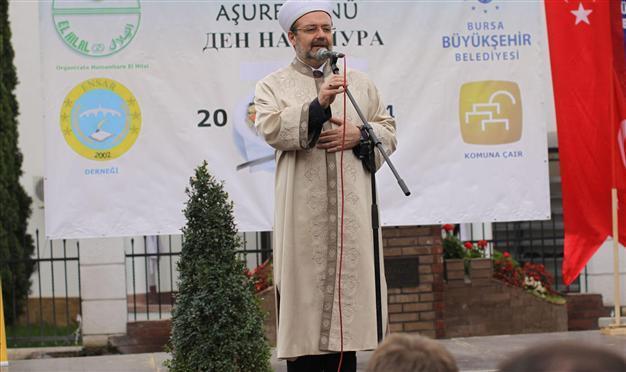Turkey’s top cleric to discuss Islamophobia with Pope Francis
ANKARA

Directorate for Religious Affairs (Diyanet) Head Mehmet Görmez. AA Photo
Turkey’s top cleric has said Islamophobia will be high on the agenda of his upcoming meeting with Pope Francis during the latter’s landmark visit to Turkey in late November.Some are presenting violent acts committed in the name of Islam as violent acts produced by Islam or all Muslims, Mehmet Görmez, the head of the Directorate for Religious Affairs (Diyanet), said in an interview with the NTV news channel, adding that the topic would be an important part of his meeting with Pope Francis.
“The turning of the presence of Islam in Europe and the world into a problem of security will be one of the most important issues that should be dealt with in the coming years,” Görmez was quoted as saying on Nov. 13. “I don’t presume that politicians can overcome this alone.”
The interview with NTV was held on the occasion of the first ever Muslim Leaders of Latin America Summit held in Istanbul this week.
Holding his current post since November 2010, the outspoken Görmez has consistently raised the issue of Islamophobia as a problem. Back in September, he drew attention to steadily rising attacks against mosques in Germany and urged the Pope to "translate words into deeds regarding the misperception and misinterpretation of Islam.”
Pope Francis is expected to touch down on Turkish soil on Nov. 28, arriving in Ankara before he visits Istanbul on Nov. 30. He will be the fourth pope to visit Turkey, following Pope Paul VI in 1967, Pope John Paul II in 1979 and Pope Benedict XVI in 2006.
“The entire world is facing a very important problem that is actually being overlooked with globalization. All cultures have intermingled across the whole world; all religions have become neighbors with each other and distant places have come closer. But the politics and the administration that rules the world are incapable of having these different religions and different cultures live together. Problems that occur in one corner of the world have started to be reflected in the same way in another corner of the world,” Görmez said.
All religious institutions have been mulling over how to foster a culture of living together in the world, and the pope’s visit to Turkey is a part of these deliberations, he added.
“At a time like this, the issue of Muslim minorities has turned into a very important question across the world, and it will continue to be so. You just see how a murder committed in Syria in the name of Islam is influencing the lives of 30 million Muslims living in Europe,” Görmez said.
The Diyanet was created in 1924 to replace the Ottoman Sheikh al-Islam, the mufti with the authority to confirm new sultans and who also served as chief legal adviser. The caliphate itself was abolished in 1924, part of early modernizing efforts by Mustafa Kemal Atatürk, who founded the secular Turkish Republic on the ruins of the Ottoman Empire.
Today, Görmez’s department drafts the weekly sermon delivered at the nation’s 85,000 mosques, which it supervises. It also employs all of Turkey’s imams, who are technically civil servants trained by the state.
















